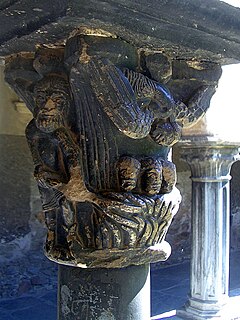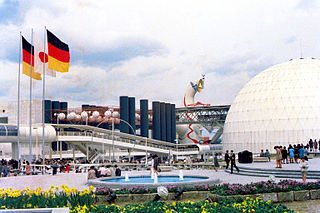
Gesang der Jünglinge is a noted electronic music work by Karlheinz Stockhausen. It was realized in 1955–56 at the Westdeutscher Rundfunk studio in Cologne and is Work Number 8 in the composer's catalog of works. The vocal parts were supplied by 12-year-old Josef Protschka. It is exactly 13 minutes, 14 seconds long.

The University of Natural Resources and Life Sciences, Vienna, or simply BOKU, founded in 1872, is an education and research centre for renewable resources in Vienna, Austria. BOKU combines fundamental and applied expertise in the fields of natural sciences, engineering and biotechnology as well as social and economic sciences to enhance the knowledge basis for sustainable management of natural resources. It is a member of the leading Euroleague for Life Sciences (ELLS) university network and the United Nations Academic Impact (UNAI) promoting international cooperation. There are currently around 12,500 students from over 100 countries enrolled at BOKU.

Bielefeld University is a university in Bielefeld, Germany. Founded in 1969, it is one of the country's newer universities, and considers itself a "reform" university, following a different style of organization and teaching than the established universities. In particular, the university aims to "re-establish the unity between research and teaching", and so all its faculty teach courses in their area of research. The university also stresses a focus on interdisciplinary research, helped by the architecture, which encloses all faculties in one great structure. It is among the first of the German universities to switch some faculties to Bachelor/Master-degrees as part of the Bologna process.

The Protestant Seminaries of Maulbronn and Blaubeuren in Baden-Württemberg, Germany, are two Gymnasien and Protestant boarding schools in the Württemberg tradition.

The Berlin-Brandenburg capital region is one of the most prolific centers of higher education and research in the world. It is the largest concentration of universities and colleges in Germany. The city has four public research universities and 27 private, professional and technical colleges (Hochschulen), offering a wide range of disciplines. Access to the German university system is tuition free.

Kontakte ("Contacts") is an electronic music work by Karlheinz Stockhausen, realized in 1958–60 at the Westdeutscher Rundfunk (WDR) electronic-music studio in Cologne with the assistance of Gottfried Michael Koenig. The score is Nr. 12 in the composer's catalogue of works, and is dedicated to Otto Tomek.
Heidegger Gesamtausgabe is the term for the collected works of German philosopher Martin Heidegger, edited by Vittorio Klostermann.
Intuitive music is a form of musical improvisation based on instant creation in which fixed principles or rules may or may not have been given. It is a type of process music where instead of a traditional music score, verbal or graphic instructions and ideas are provided to the performers. The concept was introduced in 1968 by the German composer Karlheinz Stockhausen, with specific reference to the collections of text-notated compositions Aus den sieben Tagen (1968) and Für kommende Zeiten (1968–70). The first public performance of intuitive-music text compositions, however, was in the collective work Musik für ein Haus, developed in Stockhausen's 1968 Darmstadt lectures and performed on 1 September 1968, several months before the first realisations of any of the pieces from Aus den sieben Tagen.

Eugen Fink was a German philosopher.
The Faculty of Modern Languages is one of twelve faculties at the University of Heidelberg. It comprises the Seminar for German Studies, Seminar for English Studies, Seminar for German as a Foreign Language Philology, Seminar for Translating and Interpreting, Seminar for Computational Linguistics, Seminar for Romance Studies, Seminar for Mediaeval and Neo-Latin Philology, and the Seminar for Slavic Studies.
Christian Peter "Alphons" Maria Joseph Bellesheim was a church historian. He also reviewed and collected books.
Uwe Böning is a German business coach, management consultant and author. He is considered to be one of the pioneers in German business coaching and has shaped research, practice, training and association work in this field to a great extent.
A German Akademie is a school or college, trade school or another educational institution. The word Akademie is not protected by law and any school or college may choose to call itself Akademie. A Sommerakademie is a programme that teaches different groups of children or grown-ups usually during the summer month. Sometimes those programmes are remedial in nature.
Prozession (Procession), for tamtam, viola, electronium, piano, microphones, filters, and potentiometers, is a composition by Karlheinz Stockhausen, written in 1967. It is Number 23 in the catalogue of the composer’s works.

Pole (Poles), for two performers with shortwave radio receivers and a sound projectionist, is a composition by Karlheinz Stockhausen, written in 1970. It is Number 30 in the catalogue of the composer's works.
Spatial music is composed music that intentionally exploits sound localization. Though present in Western music from biblical times in the form of the antiphon, as a component specific to new musical techniques the concept of spatial music was introduced as early as 1928 in Germany.

Expo, for three performers with shortwave radio receivers and a sound projectionist, is a composition by Karlheinz Stockhausen, written in 1969–70. It is Number 31 in the catalogue of the composer's works.
Solo for a melody instrument with feedback is a work for a soloist with live electronics composed in 1965–66 by Karlheinz Stockhausen. It is Nr. 19 in his catalogue of works. Performance duration can vary from 10½ to 19 minutes.

Für kommende Zeiten is a collection of seventeen text compositions by Karlheinz Stockhausen, composed between August 1968 and July 1970. It is a successor to the similar collection titled Aus den sieben Tagen, written in 1968. These compositions are characterized as "Intuitive music"—music produced primarily from the intuition rather than the intellect of the performer(s). It is work number 33 in Stockhausen's catalog of works, and the collection is dedicated to the composer's son Markus.

Ensemble is a group-composition project devised by Karlheinz Stockhausen for the 1967 Darmstädter Ferienkurse. Twelve composers and twelve instrumentalists participated, and the resulting performance lasted four hours. It is not assigned a work number in Stockhausen's catalogue of works.










